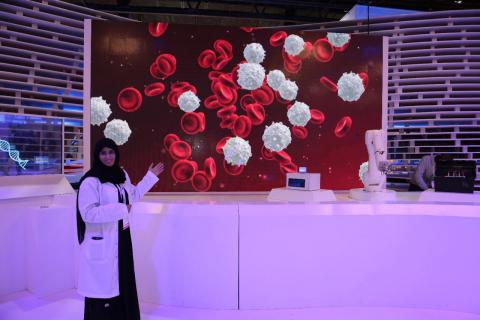
Initiative seeks to prevent genetic and non-communicable diseases
The Ministry of Health and Prevention has unveiled the UAE Human Genome Project during the ‘Arab Health 2017’ conference in Dubai in a bid to harness the power of genetic science and adopt modern and innovative techniques on DNA profiling and gene sequencing. By identifying genetic fingerprint, the project seeks to prevent the spread of non-communicable diseases in the country, including obesity, diabetes, blood pressure, cancer, and asthma, and use genetic factors as a basis for developing personalized treatment for each patient.
Dr. Youssif Al Serkal, Assistant Undersecretary for the Ministry of Health and Prevention - Hospitals Sector and Chairman of the National Committee of the UAE Human Genome Project, said the key initiative is part of the strategic planning process aimed at exploring the future of the local healthcare sector. In essence, the government strives to create a genome database and reference dictionary for all genetic diseases in the UAE as the world begins to enter a new era of genetic medicine in which DNA profiling and genome sequencing will be used as an important tool for clinical care. As a healthcare tool, both will become the basis of diagnosis for genetic and non-communicable diseases to come up with better therapeutic solutions. The strategy is seen to significantly impact the UAE’s health policy.
The UAE Human Genome Project is in accordance with the National Strategy for Innovation launched by H.H. Sheikh Mohammed bin Rashid Al Maktoum, UAE Vice President and Prime Minister and Ruler of Dubai. In terms of the local healthcare system, the national strategy enjoins the sector to improve the provision of domestic health services in accordance with the best international practices. In addition, the government, under the National Strategy for Innovation, directs the health industry to establish an environment that will encourage innovation, research, and development of advanced technological infrastructure, as well as attract future strategic partnerships with the most prestigious medical research centers and sustainable investments in the long term. The move will enhance the international competitiveness of the country’s health system according to the globally recognized standards, leading to a stronger UAE position in terms of being an international hub for innovation in the health sector.
According to H.E., the Ministry of Health and Prevention made a study on molecular genetics in Dubai, covering common diseases prevalent in UAE society such as heart disease, diabetes, and cancer. The Ministry’s objective was to find ways on how to accurately diagnose illnesses so as to make an appropriate treatment that can reduce mortality rate.
H.E. reviewed the project’s promising results so far through a series of genome analysis of samples taken from young people infected with hereditary diabetes to determine its genetic causes and subsequently identify the appropriate treatment. Moreover, as part of the project, the Ministry also examined 56 types of cancer-causing genes to provide early and appropriate treatment in a timely manner, in addition to studying congenital malformations of children due to a rare genetic disease to detect genes responsible for the disease and help families have healthy children.
Dr. Al Serkal said: “We are proud to launch this exciting project in line with our goal to embrace the latest scientific techniques and practical medical applications in the service of humanity. Through this project, we seek to reduce the patient's suffering, and improve the standard of healthcare delivery in the country, and raise the country’s score on the Global Competitiveness Index.”
Categories
- Log in to post comments
